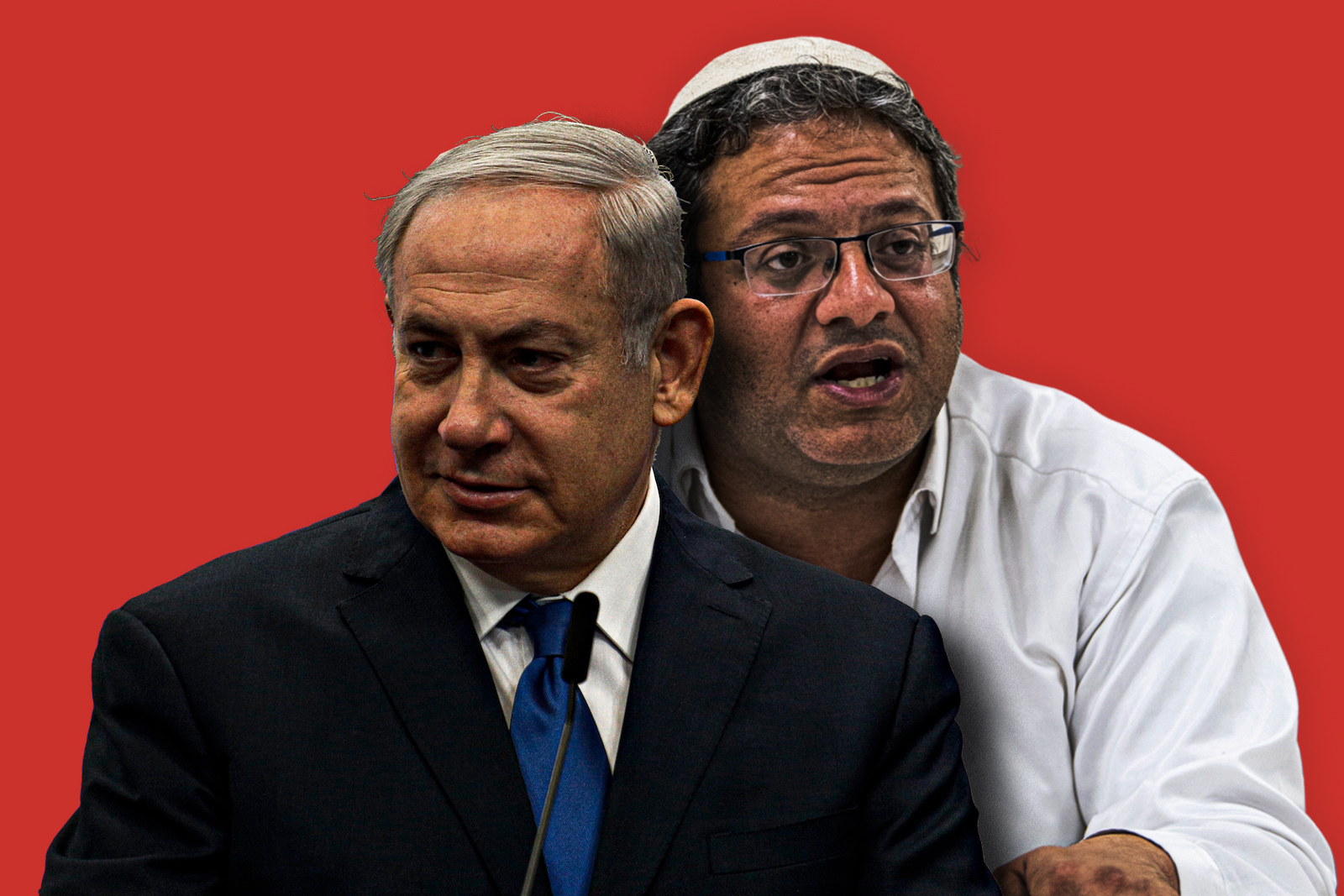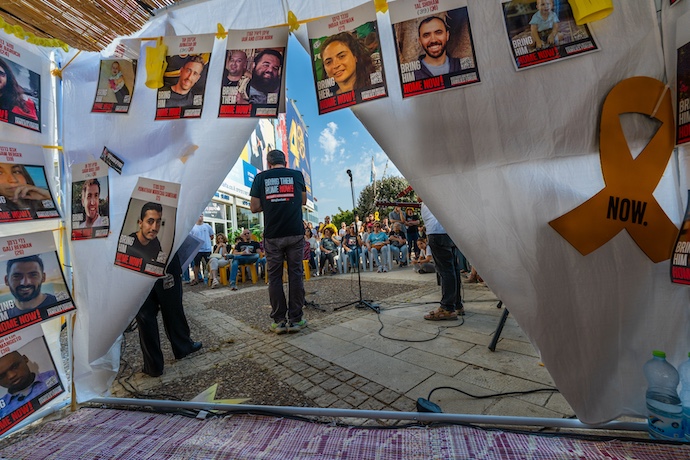
Israel is Fighting a Battle with Jewish Extremism
In recent weeks, two of the most prominent far-right politicians in Israeli Prime Minister Benjamin Netanyahu’s government, Bezalel Smotrich and Itamar Ben-Gvir, made speeches at conferences calling for the resettlement of Gaza. As hostage families and much of the population have worked tirelessly for a hostage-ceasefire deal, this action sends a troubling message to the Israeli public. Their leadership would choose to prolong this war and seize more territory rather than see a return of the hostages. This immoral prioritization of extremist values will drive Israel away from its allies and the Israeli government from its citizens.
The Israeli government’s duty lies in combating extremism, especially after the largest terror attack in Israel’s history perpetrated by Hamas militants on October 7, 2023. However, as the war enters its 11th month, it’s questionable whether or not extremism is something Israeli leadership seeks to eradicate. At this current moment, Israelis face a multi-front war with its extremist neighbors, but also an internal battle with far-right extremists in their government.

To name it plainly, Itamar Ben-Gvir and Betzalel Smotrich are the extremists Israel must fight within its borders. Since Israel’s offensive in Gaza, their ideas for messianic redemption have moved far beyond the West Bank and into the Gaza Strip. In the past few years, the West Bank has seen an alarming rise in Israeli violence towards Palestinians. Betzalel Smotrich, Israel’s finance minister, is leading a “stealth” annexation, seizing the largest amount of Palestinian territory in 30 years, and emboldening Jewish extremists to murder Palestinians in the West Bank. As finance minister, he has passed legislation to withhold Palestinian tax revenues and threatened to cut Palestinian banks from Israel’s financial system.
Most recently, Smotrich and Ben-Gvir have been keynote speakers at conferences calling for Israel’s resettlement of Gaza. Netanyahu has promised that Israel will not resettle the Gaza strip, despite his cabinet members advocating for that very aim. Smotrich’s hope for the future, as explained in Israel’s Decisive Plan, states that to end the Israeli-Palestinian conflict, Jews have to establish “new cities and settlements deep inside the territory and bring hundreds of thousands of additional settlers to live therein.” On October 21, Israeli settlers listened with admiration as Ben-Gvir and Smotrich announced their plan for Jewish redemption — Gaza resettlement – while members of the Hostage and Missing Families Forum protested the prolonged war outside. Barred from entering, the Israeli government declared their loyalty to extremist ideology, giving up on the lives of the hostages still held in Gaza today.
Israel’s international partnerships have already been under tremendous tension from threats of annexing the West Bank and the rise of extremist settler violence. Similar threats regarding the Gaza Strip will only exacerbate those tense relationships, yet it’s exactly what we’re seeing. Their choice to enact policy based on ideology is an example of poor leadership and an immense lack of strategic thinking typically required of such high-level government officials.
The measures already taken in the West Bank, and those proposed for the Gaza Strip, work to undermine the long-term safety and security of Israel, as well as the Jewish nature of the state. If the Palestinian territories were to be officially annexed, Israel would face a threat to either its Jewish nature or its democratic nature, when it shouldn’t give up either facet. Annexation with full civil rights granted to Palestinians would mean an imminent Arab majority within Israel, degrading the Jewish nature. Annexation without granting Palestinians full and equal civil rights would degrade the democratic nature of Israel, as well as its defense against accusations of apartheid.
As this threat looms, more covert actions have been taken by Israeli officials that work to destroy Israel’s security. Weakening the Palestinian Authority puts more power in the hands of Hamas leadership and gives their movement more sway within Palestinian society. When the PA is perceived as weak, Palestinians turn to Hamas as a force that can deliver results through strength.
The current Israeli leadership falsely purports that through settlements comes security despite the history and evidence proving otherwise. Average Israeli deaths from violence out of Gaza decreased from 30 deaths per year to 10 since the withdrawal in 2005. Allowing the most extreme sectors of Israeli society to live among the most extreme sectors of Palestinian society would place everyone’s lives in danger, not just theirs. The settlement enterprise, whether it expands back to Gaza or not, threatens Israel’s standing as an American ally.

As long as Netanyahu and his extreme cabinet members work against more moderate Palestinian forces, the extremist ones will prevail.
As the United States and the international community become increasingly intolerant of Israel’s military campaign in Gaza, its most prominent ministers publicly declare their desire to permanently occupy and settle the Gaza Strip. The flagrant espousal of extremist ideology does nothing to promote the U.S.-Israel relationship and everything to destroy it. Shared democratic values like human rights and equality are the bedrock of a strong U.S.-Israel relationship. Israel is attempting to partner with the U.S. in efforts of counterterrorism and combating religious extremism, all while allowing and embracing Jewish extremism at home.
Thinking in diplomatic terms, Israel’s ability to be a vital partner in combating violent regional threats is compromised by its involvement in the West Bank. Historical tensions in U.S.-Israel relations are exacerbated by Israel’s settlement expansion project, as it directly threatens the stability and security in the region. These settlements are strategically located to disable Palestinian contiguity, making the two-state solution impossible.
All of this must make Israelis and Jews question whether the religious Zionist parties running the government hope to make Israel more secure or merely to realize their own messianic vision through violence.
Netanyahu must realize that extremist policies lay the groundwork for Palestinian extremism and continue to put Israeli lives at risk. The Israeli government should honor the will of its people and demand Netanyahu be held accountable for his various crimes, corruption, and the execution of this war. Opposition forces and any remaining moderate voices in power should provide legitimate alternatives to Netanyahu, outlining a clear path forward that doesn’t embolden extremism.
The Israeli government must crack down on settlement expansion and hold its ministers accountable for their dangerous rhetoric. Everyone must understand that one cannot effectively battle Islamic religious extremism with Jewish religious extremism.
As Israel’s most significant ally, the United States must make it clear that there is no place for extremism within the Israeli government. If this partnership persists, the United States must publicly believe in the goodness of the state while working to end this dark period and crisis of leadership. During the remainder of President Biden’s time in office, he should reiterate the expectations of the American public and offer a viable path towards a two-state solution that can roll over into the next four years.
As President-elect Donald Trump prepares to take office in January, he should leverage the trust he has built with Benjamin Netanyahu to secure a deal and bring the war to a close. The international community rightly worries about the world’s future under a second Trump presidency. His record of negotiating normalization deals should be noted and expanded upon to restabilize the region.
American Jews must remain committed to the Jewish state but not be mistaken about how to commit themselves. Will they accept the status quo, allowing extremists to drive a beloved country into the abyss? Or will they choose to join the fight Israeli citizens are already fighting? Will they join them in criticizing, protesting, and expecting better from the country they love so much?
The Jewish people’s deep love for Israel should demand they speak out, for the greatest tragedy in their lifetime would be to watch Israel become a state that celebrates extremism, too similar to the enemies it has known since its founding.
